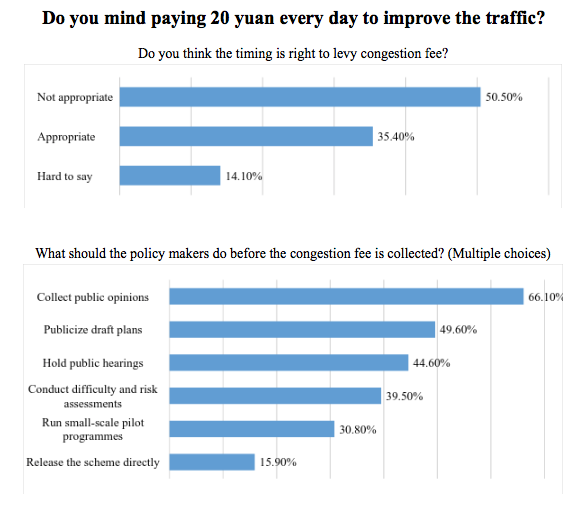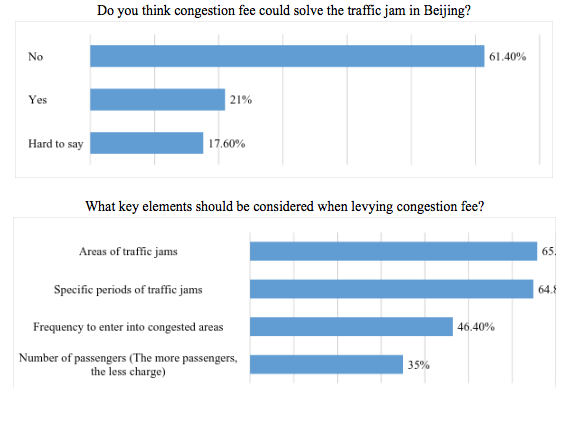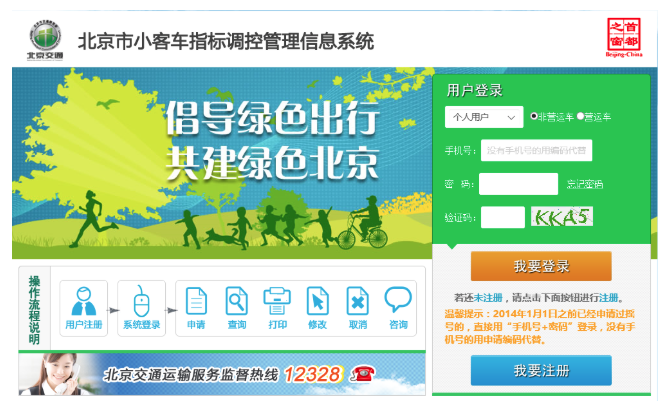Beijingers are wondering if the city government will soon launch a congestion charge to discourage people from driving, as part of measures to cut air pollution from car exhaust fumes.
Beijing’s transportation planners first floated the idea of a congestion charge – a levy on drivers to discourage car use – in 2012, after launching a licence plate lottery in 2011 to restrict new car registrations and discourage car ownership. They did not take action on congestion charging in 2012, but there are signs that it may be moving up the legislative agenda.
On June 14, Beijing municipal government’s legislative office published its plans for the year – which included investigating new regulations to ease congestion.
At a Beijing People’s Political Consultative Conference on May 27, the city’s environmental authorities and transportation commission had previously indicated that policy and technical proposals for a congestion charge were already being drafted.
Wary public response
“Beijing congestion charge” catapulted to the top of the Internet’s most-searched terms after the June 14 announcement, as the public looked for further information, and a debate kicked off on internet forums.
One survey suggests the public remain sceptical. The poll, run on an internet forum of official state news agency Xinhua, found 50.5% of respondents opposed a levy of 20 yuan (US$3) a day, while 60% said a congestion charge would not solve the problem. (See table below).


A survey carried out on a Xinhua forum found that overall Internet users were not keen on the idea of a congestion charge.
However, specialists like Zhu Tong, director of the College of Environmental Sciences and Engineering at Peking University, also raising questions about how effective a congestion charge is likely to be.
Experts doubtful
In a recent paper, “A transportation solution for clean air,” co-written with professor Frank Kelly who is director of the environmental research group at King’s College London, the pair argued that a congestion charge will have limited effect as long as overall vehicle numbers are rising.
It needs to be part of a bigger package of well-coordinated measures, focused on expanding public transport, according to the paper, published in Science on May 20.
They found road traffic exhaust remains Beijing’s main source of fine particulate and nitrogen dioxide pollution, which can cause or exacerbate asthma and lung damage. Fine particulates such as PM2.5 and PM10 particles, many times thinner than a human hair, can penetrate deep into the lungs and clog the bloodstream.
But as most cars sold in China – particularly in Beijing – use the latest technology, there is not much room to reduce the city’s exhaust emissions further, the paper says.
Unfortunately, beneficial moves like enforcing stricter vehicle emissions controls, limiting car use (Beijing already restricts each car’s driving days by licence plate) and building more subway lines will have limited impact because the overall number of cars on Beijing’s roads is still increasing too rapidly, they argue.

The vehicle lottery site opened on January 1, 2011. Residents have to use this site if they wish to purchase a car.
It rose from 1.5 million cars in 2000 to 5.6 million in 2015. Lined up bumper-to-bumper, they would stretch 28,000 kilometres – more than half way round the equator.
Even zero-emission vehicles aren’t a perfect solution – more fundamental changes to public transportation are needed to tackle congestion and gridlock, say Zhu and Kelly. They advocate a range of flexible and convenient options for “the last mile.”
Niu Fengrui, former head of the Chinese Academy of Social Sciences’ Institute for Urban and Environmental Sciences is also doubtful whether congestion charges can have a significant impact given there remains a shortfall of public transport for a rapidly-rising population, “meaning there are supply and demand issues.”
“It’s a problem which requires long-term and comprehensive solutions – a congestion charge alone won’t be enough,” he adds, saying the key is to develop the public transport system.
London and Singapore
Congestion charges are an economic lever to manage traffic levels. They have been used in Singapore, which charges drivers per journey, since 1975 and in London, which charges drivers entering the city centre, since 2003.
Singapore’s rates vary from S$0.50 to S$3.00 (US$0.37 to US$2.22) depending on the route, time and vehicle type.
London’s congestion charges cover eight square miles (about 20 square kilometres) of the city centre. Anyone entering this zone between 7am and 6pm on a weekday is charged £11.50 (US$15). In July, new London mayor Sadiq Khan proposed levying an additional toxicity charge on older vehicles manufactured before 2005.
Existing policy documents suggest Beijing planners favour the London option. In 2013 the Beijing 2013-2017 Clean Air Action Plan stated that research would be done into a congestion charge to be applied within a Low Emissions Zone.
However, it remains unclear if the city government will proceed. The idea was first floated in 2010, in a report by Caijing Economy and Nation Weekly, published by the state news agency Xinhua. This was widely regarded as the start of attempts to gauge public reaction. Beijing’s Plans for transportation during the 12th Five-Year Plan period, issued in 2012, said that the city would develop a congestion charge policy by 2015. The question is therefore whether the policy is low priority, or rising up city planners’ ‘to do’ lists.







